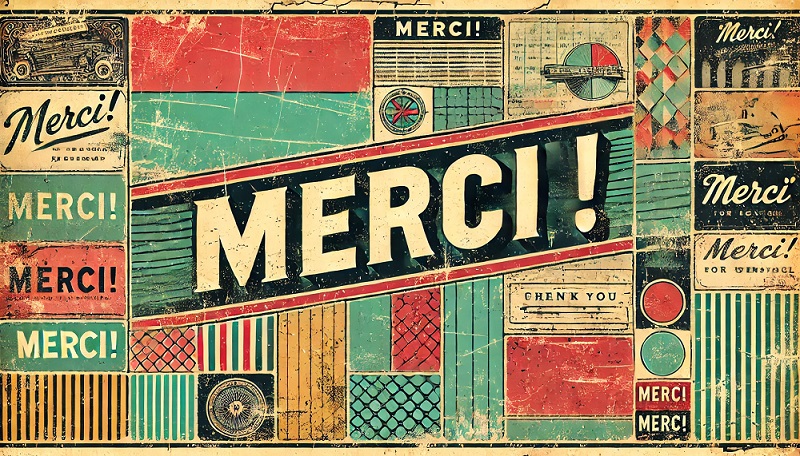Merci and other expressions in French
In French, there are a lot of ways to say thank you. Usually you can suffice with just a simple merci, which you problably already know. But there are more forms that are sometimes better suited for the occasion, each tailored to specific contexts, levels of formality, and emotional intensity. Understanding when to use each expression helps convey your message effectively. Below is first a list of all the ways how to say thank you in French.
| Saying thank you in French | |
| Merci | Thank you |
| Merci beaucoup | Thank you very much |
| Merci bien | Thanks a lot |
| Merci infiniment | Thank you infinitely |
| Un grand merci | A big thank you |
| Mille mercis | A thousand thanks |
| Je te remercie | I thank you (informal) |
| Je vous remercie | I thank you (formal or plural) |
| Merci du fond du cœur | Thank you from the bottom of my heart |
| C’est vraiment gentil, merci | That’s really kind, thank you. |
| Je vous suis reconnaissant(e) | I am grateful to you. |
Merci
This is the most common and simplest way to say “thank you” in French. It is used in everyday situations, from thanking someone for holding the door to expressing gratitude for a small favor. It can stand alone and is suitable in both formal and informal contexts. If you are just starting out with French, you want to stick with just saying merci
Merci beaucoup
If you want to intensify your thanks, merci beaucoup (thank you very much) is the go-to phrase. It’s appropriate in all situations, whether you’re thanking a friend for a gift or showing appreciation to a colleague for their assistance. The addition of beaucoup adds a layer of politeness and emphasis.
Merci bien
Though it sounds polite, merci bien can sometimes be used sarcastically, depending on the tone. Generally, it means “thanks a lot” and can be used in casual settings, but caution is needed to ensure the tone is appropriate.
Merci infiniment
This expression translates to “thank you infinitely.” It is slightly more formal and conveys deep gratitude. You might use it in situations where someone has gone out of their way to help you, and you want to show that their effort means a lot to you.
Un grand merci
Un grand merci (a big thank you) is informal yet warm. It’s perfect for situations where you want to thank someone more personally but not too formally. It can be used among friends or in casual emails, acknowledging a kind gesture with enthusiasm.
Je te remercie and Je vous remercie
Both mean “I thank you,” but te is used for informal, singular situations, while vous is reserved for formal or plural contexts. These phrases are typically used when you want to personalize your gratitude. For example, after receiving professional help or advice, you would use Je vous remercie to maintain politeness.
Merci du fond du cœur
This translates as “thank you from the bottom of my heart” and is best used when someone has done something significant for you. It’s ideal for heartfelt moments, such as thanking a close friend or family member for emotional support.
Je vous suis reconnaissant(e)
This means “I am grateful to you.” It is more formal and often used in written communication or in professional settings when you want to express deep appreciation for something significant, like a promotion or an opportunity.
Mille mercis
Mille mercis, which means “a thousand thanks” is a more poetic or exaggerated way of saying thank you. It is lighthearted and often used in personal messages or when thanking someone for a large favor.
Read more

